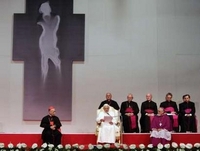Magister highlights the letter 38 Muslim scholars have written to the Pope:
The authors of the letter welcome and appreciate without reservation the clarifications made by Benedict XVI after the wave of protests that issued from the Muslim world a few days after the lecture in Regensburg, and in particular the speech that the pope addressed to ambassadors from Muslim countries on September 25, and also the reference made by cardinal secretary of state Tarcisio Bertone, in a note issued on September 16, to the conciliar document “Nostra Aetate.”
And not only that. They condemn with very strong words the assassination that took place in Somalia, in Muslim Mogadishu, of sister Leonella Sgorbati, thereby linking this to the protests that were at their peak at the time:
“We must state that the murder on September 17th of an innocent Catholic nun in Somalia – and any other similar acts of wanton individual violence – ‘in reaction to’ the lecture at the University of Regensburg, is completely un-Islamic, and we totally condemn such acts.”
The authors of the letter appreciate Benedict XVI’s desire for dialogue and take very seriously his theses. “Applaud” pope’s “efforts to oppose the dominance of positivism and materialism in human life,” while contest him on other points, adding their reasons for their opposition.
In this sense, the letter signed by the 38 – together with the preceding essay by Aref Ali Nayed, previewed by www.chiesa on October 4 – goes towards what the pope meant to accomplish with his audacious lecture in Regensburg: to encourage, within the Muslim world as well, public reflection that would separate faith from violence and link it to reason instead. Because, in the pope’s view, it is precisely the “reasonableness” of the faith that is the natural terrain of encounter between Christianity and the various other religions and cultures.
The story of the Genoa mosque has become the topic of a national debate since Monday, when a well-known Islamic expert, Magdi Allam, accused the Capuchin friars of ‘selling out to extremists’ in an article published on the front page of daily Corriere della Sera.
Gambaro has since found himself in the midst of a crossfire of criticisms fired at him by Allam on one side and Catholic conservatives on the other.
‘The Genoa mosque will become a meeting point for those Muslims communities that we have recently seen on television lashing out at the pope,’ thundered Gianni Baget Bozzo, a Catholic priest and a close political advisor of former conservative prime minister Silvio Berlusconi.

